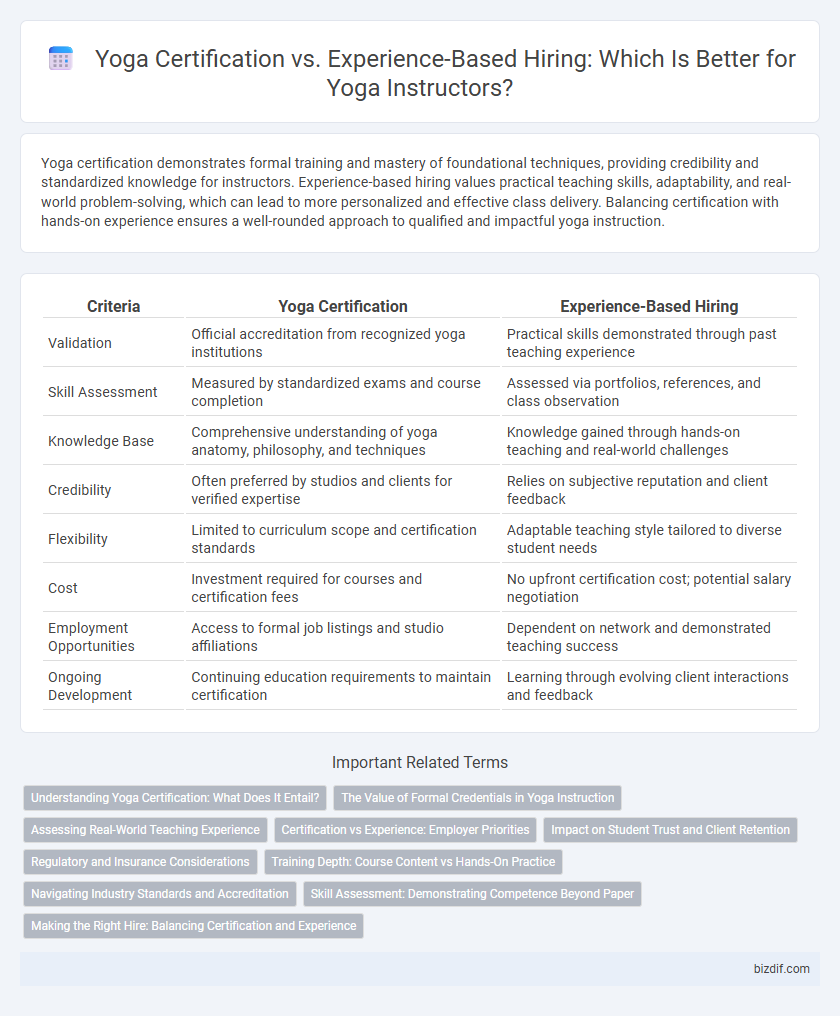Yoga certification demonstrates formal training and mastery of foundational techniques, providing credibility and standardized knowledge for instructors. Experience-based hiring values practical teaching skills, adaptability, and real-world problem-solving, which can lead to more personalized and effective class delivery. Balancing certification with hands-on experience ensures a well-rounded approach to qualified and impactful yoga instruction.
Table of Comparison
| Criteria | Yoga Certification | Experience-Based Hiring |
|---|---|---|
| Validation | Official accreditation from recognized yoga institutions | Practical skills demonstrated through past teaching experience |
| Skill Assessment | Measured by standardized exams and course completion | Assessed via portfolios, references, and class observation |
| Knowledge Base | Comprehensive understanding of yoga anatomy, philosophy, and techniques | Knowledge gained through hands-on teaching and real-world challenges |
| Credibility | Often preferred by studios and clients for verified expertise | Relies on subjective reputation and client feedback |
| Flexibility | Limited to curriculum scope and certification standards | Adaptable teaching style tailored to diverse student needs |
| Cost | Investment required for courses and certification fees | No upfront certification cost; potential salary negotiation |
| Employment Opportunities | Access to formal job listings and studio affiliations | Dependent on network and demonstrated teaching success |
| Ongoing Development | Continuing education requirements to maintain certification | Learning through evolving client interactions and feedback |
Understanding Yoga Certification: What Does It Entail?
Yoga certification involves completing structured training programs accredited by recognized institutions, covering anatomy, philosophy, teaching techniques, and ethics. These certifications validate a practitioner's knowledge and skills, ensuring adherence to established standards and enhancing credibility with clients and studios. Experience-based hiring may value practical teaching hours and personal practice depth, but certification provides a standardized measure of competency and professional accountability in the yoga industry.
The Value of Formal Credentials in Yoga Instruction
Formal yoga certification offers standardized training, ensuring instructors possess foundational knowledge of anatomy, philosophy, and teaching techniques essential for safe practice. Employers prioritize certified instructors due to verified competencies, increasing credibility and trust among students and studios. While experience enhances skill, certification provides a concrete benchmark for professionalism and accountability within the competitive yoga industry.
Assessing Real-World Teaching Experience
Assessing real-world teaching experience in yoga offers valuable insights beyond formal certification by highlighting practical skills in class management, student interaction, and adaptability to diverse needs. Experienced instructors demonstrate refined techniques and conflict resolution abilities developed through direct engagement with students. Employers prioritizing hands-on experience often find these attributes essential for fostering effective learning environments and ensuring student retention.
Certification vs Experience: Employer Priorities
Employers in the yoga industry often prioritize certification for verifying a candidate's foundational knowledge and adherence to recognized safety standards, ensuring credibility and client trust. However, experience-based hiring values practical teaching skills and the ability to adapt classes to diverse student needs, reflecting real-world effectiveness. Balancing certification with demonstrated teaching experience typically results in the most preferred candidates for yoga instructor positions.
Impact on Student Trust and Client Retention
Yoga certification validates an instructor's expertise through standardized training, enhancing student trust by assuring consistent knowledge and safety practices. Experience-based hiring emphasizes practical teaching skills and adaptability, which directly influence student engagement and personalized instruction. Balancing certification credentials with demonstrated teaching experience fosters higher client retention by building credibility and delivering tailored, effective yoga sessions.
Regulatory and Insurance Considerations
Yoga certification ensures compliance with regulatory standards and qualifies instructors for necessary insurance coverage, reducing legal liabilities. Experience-based hiring may lack formal proof of competency, possibly resulting in inadequate insurance protection and increased risk exposure. Insurers often require verified certification to underwrite coverage, highlighting its importance in professional yoga instruction.
Training Depth: Course Content vs Hands-On Practice
Yoga certification programs emphasize comprehensive course content, including anatomy, philosophy, and teaching methodologies, ensuring a structured learning path. Experience-based hiring prioritizes hands-on practice, valuing real-world teaching exposure and adaptability in diverse class settings. Combining thorough theoretical knowledge with extensive practical experience fosters well-rounded, effective yoga instructors.
Navigating Industry Standards and Accreditation
Yoga certification offers standardized validation of skills aligned with industry standards and recognized accreditation bodies such as Yoga Alliance, enhancing credibility and trust for instructors. Experience-based hiring values practical teaching abilities and personal growth, often favoring in-studio or community recommendations over formal credentials. Navigating industry standards requires balancing certified qualifications with demonstrable teaching experience to meet diverse employer expectations and maintain professional legitimacy.
Skill Assessment: Demonstrating Competence Beyond Paper
Skill assessment in yoga instruction emphasizes practical competence over formal certification, highlighting the importance of hands-on teaching ability, adaptability, and student engagement. Experienced instructors often showcase mastery through real-time class management, effective communication, and personalized adjustments, which certification alone may not guarantee. Employers prioritizing skill assessment value demonstrated teaching proficiency and the ability to foster a safe, supportive yoga environment beyond mere paper qualifications.
Making the Right Hire: Balancing Certification and Experience
Choosing the right yoga instructor involves balancing formal certification with hands-on teaching experience to ensure both knowledge and practical skills. Certified instructors demonstrate adherence to standardized training and safety protocols, while experienced teachers bring insights from real-world class dynamics and student engagement. Prioritizing candidates with a blend of recognized credentials and substantial teaching practice leads to more effective and reliable yoga instruction.
Yoga certification vs Experience-based hiring Infographic

 bizdif.com
bizdif.com